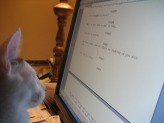1.) What do you want art to do?
Your answers: Fill my mind, challenge, change us and make us more aware of ourselves, one another, and the world.
My answer was nearly identical to Molly's answer of "I want art to invite me to think or to feel. " She used invite, when I just said make. Strong word choice.
2.) What do you think art is to the common American/Australian (or whomever else)?
Your Answers: Misunderstood, under appreciated, as entertainment, weird, not important, ornamental, decorative.
I agree with all of you on all those points. My specific answer was that the common American sees art as entertainment or decoration, but often also art events are things you attend so you can be seen. How many people attend the Met's opening night gala every year who care absolutely nothing about opera? They just want to wear their glamorous borrowed clothing and jewelry and be photographed looking cultured and just as cool as all of the other glamorous people there.
3.) What do you want art to be for the common American/Australian (or whomever else)?
Your answers: Exciting, invigorating, fun, cool, magic, something that makes the common American more empathetic. Molly said "I want art to be for the common American what it is for me." Another friend said that he didn't care about what art was to the common American.
That's an interesting batch of answers. I'm particularly drawn to a few points there: Invigorating, magic, empathetic.
Molly's point is interesting - it would be great if everyone thought art was as wonderful as we artists do, but I think we need some sort of a gradient amount of interest. This is going to sound a little selfish, but we need some people who are a sort of culture or taste expert. If everyone was equally excited by art, that might make all of the time and effort put in by dedicated artists seem just as meaningful as the casual artist. Not that the casual artist doesn't produce meaningful work: It's a tricky subject. Many of my friends and I have one, two, or three degrees in our field, and we've spent countless hours of practice and study fine-tuning what we do. Do you get what I mean?
The friend who doesn't care about what art is to the common American: that's a dangerous viewpoint. I think the common American should be able to enjoy art. I understand not wanting to "dumb down" art for the masses, and I wouldn't expect everybody to want to do that. However, we as artists all have an audience. If we're Richard Wagner, it's going to be a giant group of devoted followers who will seek out our art. If we're John Williams, our audience won't be there for us, but will generally enjoy our work. Heck, if we're Johannes Brahms, our audience will mostly be just Clara Schumann and a few other close friends. That doesn't make one piece of art more worthwhile than another - all are needed.
My answer: People should have easier access to free, cheap, or affordable art that will make them think and feel. Everyone has different levels at which they want to be challenged. Not everyone will want to listen to Shostakovich in the afternoon. Sometimes even I don't, and Robyn is as much as I want to be challenged that day. Either way, I should have access to the oppportunities that I want. The internet is helping greatly with that, but nothing beats a live performance, especially when it comes to my next point: I want the common American to be able to experience art as a community-builder. There's such a great feeling when you leave a good concert or other performance and other people feel the way you do. I wanted to dance and make friends with everybody after seeing Tune-Yards or Yeasayer in concert. I wanted to have deep, philosophical conversation after seeing Mahler 2 in concert. I wanted to sit down with everybody and make sure everyone felt welcome in our audience community after seeing Peter Grimes. This goes back to thinking and feeling: it's great stuff. It's a powerful drug. I think, for the right person, it has the power to change opinions.
4.) Why are you an artist?
Your answers basically boiled down to "I wouldn't know what else to do" and "that's the best way for me to express myself." Molly had an interesting point with it's fun, I enjoy the social aspect, and I like the attention. I hadn't thought of those last three, and I think they're perfectly valid.
My answer: I want to know myself, connect with my community, make people feel, and make people think. Even if I only ever manage to entertain, I'm happy with that. There's value in entertainment. I would hope to be able to do more than that and really make people think and feel more complex things, but any way I can help bring people together would be a success in my book.
Thank you, everybody, for your input. I love talking about this stuff, and you've all helped to make this topic way more interesting!
 RSS Feed
RSS Feed

